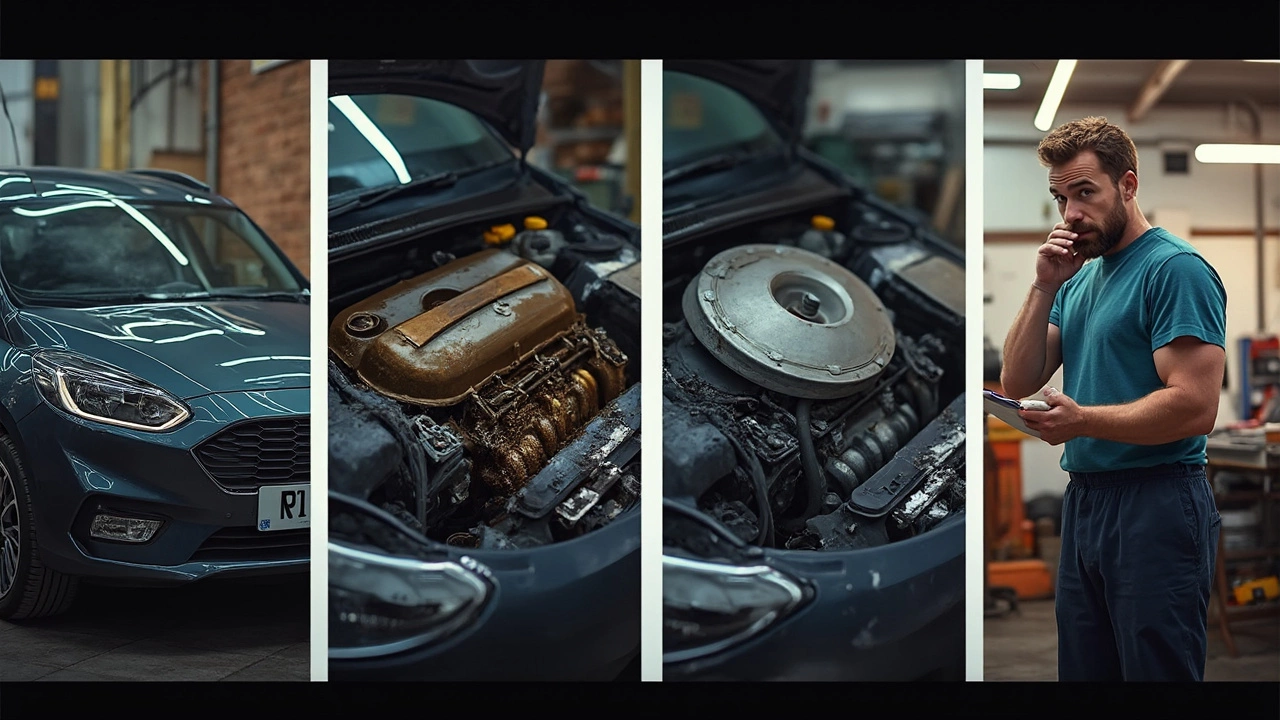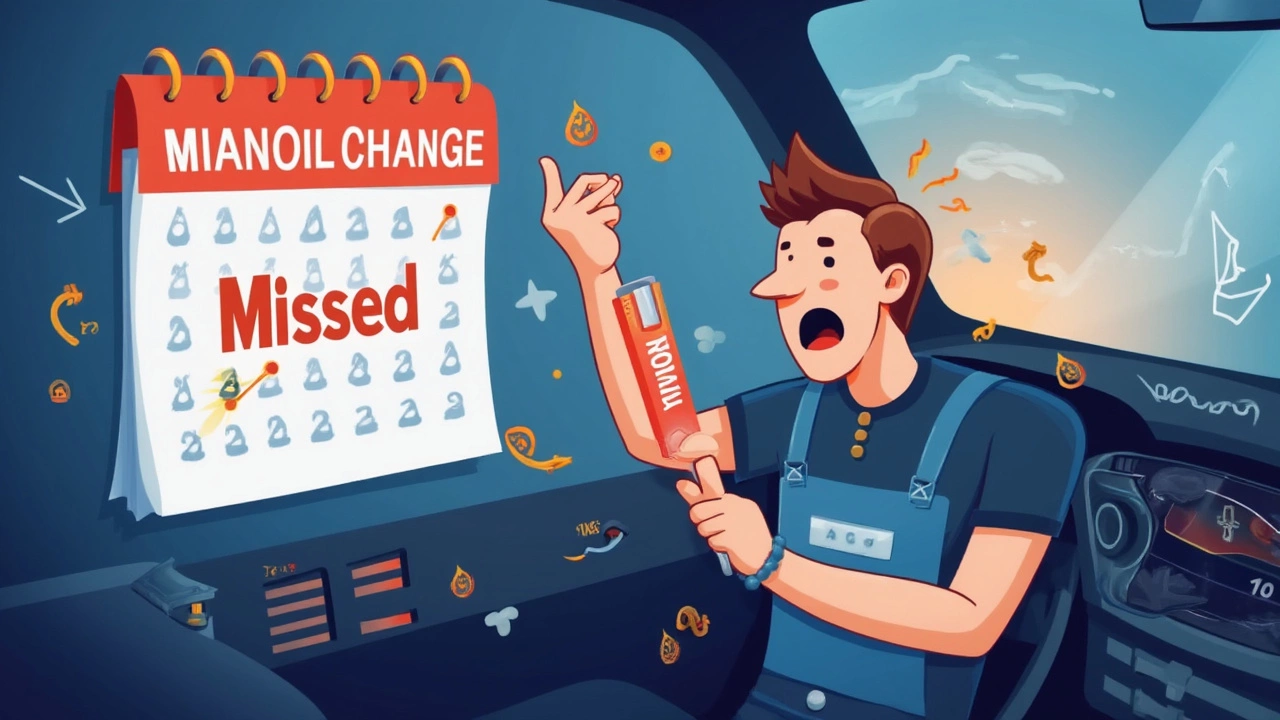Oil changes usually feel like just another annoying chore on your checklist, right? But here's the blunt truth: putting off an oil change doesn't just stretch your luck—it can do some real damage to your engine. When you pass up fresh oil, your engine loses its main shield against heat and friction.
Think about it. Engine oil is there to lubricate all the moving parts, so they glide past each other instead of grinding down. Skip a change, though, and your oil starts to break down. Pretty soon, it's more like sludge than a lubricant. Sludge doesn't keep your engine cool or clean—so you end up with parts wearing down, overheating, and even sticking together.
And here's something most people don't realize: old, dirty oil collects metal shavings and dirt. If you leave it in too long, all those tiny bits float around your engine, scratching up the surfaces every time you drive. That’s not just bad news—it's expensive news, because now you’re talking about real repairs, not just a $40 oil change.
- Why Engine Oil Matters
- How Skipping Oil Changes Damages Your Engine
- Signs Your Oil Needs Changing
- Real-World Consequences: Stories and Costs
- Simple Tips to Keep Your Engine Healthy
Why Engine Oil Matters
Your car’s engine is full of metal parts hitting, spinning, and rubbing against each other at crazy speeds. Without engine oil, all that metal-on-metal action would turn your engine into a hunk of scrap in record time. Oil forms a thin film between these parts, reducing direct contact and handling the heat that builds up. According to research from the American Automobile Association (AAA), modern engines can reach up to 250 degrees Fahrenheit after just 20 minutes of driving—which would fry things fast without proper lubrication.
But engine oil does more than just lubricate. It’s also the chief cleaner in your engine. It sweeps up dirt, carbon, and tiny metal particles, holding them in suspension so they don’t stick to important stuff. That’s one reason your oil turns dark—not because it’s "gone bad," but because it’s busy doing its job.
You’ll also find that clean oil helps keep your engine sealed tight. It fills in the little gaps between the piston rings and cylinder walls, so you don’t lose power or burn extra fuel. This means better performance and fewer trips to the gas station.
Ever wondered what the pros think? Here’s a quote from John Nielsen, director of engineering and repair at AAA:
“Regular oil changes are the single most important thing you can do to extend the life of your vehicle’s engine.”
Just in case you’re curious how fresh oil stacks up to gunky oil, check out this basic table of what each does for your ride:
| Fresh Oil | Dirty Oil |
|---|---|
| Lubricates parts well | Turns thick, struggles to lubricate |
| Carries away heat | Overheats your engine |
| Keeps engine clean | Spreads sludge and debris |
| Boosts fuel efficiency | Lowers performance, wastes fuel |
So if you want your engine oil to do its job—protecting, cooling, cleaning, and sealing—make sure you give it a chance by changing it before things get ugly.
How Skipping Oil Changes Damages Your Engine
Miss a scheduled oil change, and you’re doing your engine no favors. Without fresh engine oil, the moving metal parts inside your car start to run dry. Instead of gliding, they rub directly against each other, wearing down way faster than you’d expect.
Let’s get real—the main job of engine oil isn’t just to make things slippery in there. It also carries away heat, keeps everything running cool, and traps dirt and tiny metal bits. When oil gets old, it breaks down and stops being good at any of these jobs. Over time, what once looked like clean honey turns into thick, black gunk.
Here’s what actually goes wrong when you skip oil changes:
- Increased Friction: Old oil can’t lubricate properly, so metal scrapes metal. This grinds down key engine parts.
- Overheating: Fresh engine oil absorbs and redistributes heat. Dirty oil lets the temperature spike, leading to warped parts and gasket leaks.
- Sludge Buildup: Oil that sits too long gets thick and gooey, clogging narrow oil passages. Some mechanics have even pulled off valve covers to find surfaces coated in tar-like sludge.
- Corrosion: Engine parts stay in contact with contaminated oil full of acids and moisture. That leads to rust, eating away at your engine from the inside.
- Engine Wear: All that rubbing and heat makes engine components like pistons and bearings wear out early. That shortens your engine’s life and can mean total failure.
Check this out—AAA ran a study and found that delaying regular oil changes is a common reason engines lock up or fail early. And mechanics see this all the time. When a car comes in with a knocking noise, it’s often because of neglected engine oil.
| Engine Problem | Likely Cause | Typical Repair Cost |
|---|---|---|
| Piston Seizure | Bad or old oil | $1,000 - $3,500 |
| Oil Pump Failure | Sludge buildup | $300 - $800 |
| Rod Bearing Wear | Dirty oil | $1,500 - $2,500 |
The bottom line: if you skip oil changes, you risk way more than a dirty engine. You set yourself up for costly breakdowns and serious damage, sometimes after just one missed service.

Signs Your Oil Needs Changing
It's not always obvious when your engine oil needs to be changed. Modern cars track miles or time, but don't count on the dash light to save you every time. Your engine could be crying for help long before you see a warning.
So, what should you watch for? Here are the classic signs your oil change is overdue:
- Dirty or gritty oil. Take out the dipstick. If the oil looks black or you see little bits in it, you're overdue. Fresh oil is usually amber and smooth.
- Engine running louder or rougher than usual. Old oil can't cushion the moving parts, so your engine sounds noisier or maybe even knocks.
- Oil change light or check engine light. Some cars have a dedicated oil change reminder, but even the generic check engine light could mean oil problems if everything else checks out.
- Burning oil smell or oil smells burnt. Overworked engine oil loses its ability to cool, leaving you with a cooked smell under the hood, or even inside the cabin.
- Lower oil level. Old oil can burn up faster, so if you spot the level dropping faster than normal, it’s time to act.
- Exhaust smoke. A little vapor is normal, but smoke means oil isn’t doing its job or is leaking inside the engine—especially if it’s blue or gray.
Want some stats? Here’s how many miles people push their car maintenance and what trouble it brings:
| Miles Without Oil Change | Common Problems |
|---|---|
| 5,000-7,000 miles | Oil starts breaking down, filter clogs, mild engine wear |
| 10,000+ miles | Heavy sludge, ticking sounds, risk of engine damage |
| 15,000+ miles | Major engine wear, overheating, increased repair bills |
Keep an eye and ear out for these signals. If you notice any, don’t gamble—make that oil change a priority. It’ll save you way more money and headaches in the long run.
Real-World Consequences: Stories and Costs
If you think skipping an oil change just leads to a warning light, the truth is often way worse. Every year, repair shops see cars towed in with engines wrecked simply because someone ignored their engine oil. Here are a few real-life examples and the numbers behind them.
Take Steve from Michigan. He pushed off changing his oil for almost a year, figuring he'd get to it 'eventually.' One morning, his Honda started knocking bad, lost power, and died in the middle of traffic. The shop quote? $4,200 for a replacement engine. It could have been a $50-$70 oil change.
Or think about a rideshare driver who skipped his regular oil change to save time. After just six months, his Toyota’s engine was full of thick sludge. This wasn't just a simple fix. The repair shop had to clean internal parts and swap out damaged sensors—bill: $1,800. That car was off the road for a week, so he lost work too.
Now let’s talk numbers. According to a 2023 survey from the Car Care Council, almost 20% of vehicles inspected were low or dirty on engine oil. Engines that run with bad oil are far more likely to suffer from overheating, oil starvation, or total failure, sometimes before hitting 100,000 miles—way ahead of their expected lifespan.
| Engine Damage | Typical Repair Cost | Downtime |
|---|---|---|
| Replace Engine | $3,500 – $7,000 | 1-2 weeks |
| Sludge Clean-Out | $600 – $2,000 | 2-5 days |
| Main Bearing Repair | $1,500 – $3,000 | 3-7 days |
Skipping regular oil changes might feel like you’re saving money, but the math never works out. The cost for basic car maintenance is peanuts compared to fixing—or worse, replacing—a damaged engine. If you want your car to last, changing your oil isn’t optional. It’s the bare minimum.

Simple Tips to Keep Your Engine Healthy
You don’t need to be a car expert to keep your engine in good shape. There are some easy steps you can take that go a long way.
- Check your oil level every month. Pop the hood when your car is cold, pull out the dipstick, wipe it, reinsert, and check the level. If it’s low or looks dirty, it’s time for attention.
- Stick to the oil change schedule listed in your owner’s manual. Most cars today need new engine oil every 5,000 to 7,500 miles, but heavy use (like towing or short city trips) means you’ll want to do it sooner.
- Pick the right type of oil. Some cars run best on synthetic, others on conventional. Using the wrong oil can mess with your engine oil pressure and lead to quicker wear.
- Don't just swap the oil—change the oil filter too. A clogged filter just pushes old gunk right back in.
- Watch for leaks. Oil stains under your car or a burning smell can mean your engine oil is leaking. Fixing a small leak now beats major repairs later.
Did you know almost 40% of engine failures are linked to missed or overdue oil changes? Here’s a quick look at how often different drivers typically need to change their oil:
| Driving Style | Oil Change Interval |
|---|---|
| Mostly Highway | Every 7,500 miles |
| City Stop-and-Go | Every 5,000 miles |
| Towing/Heavy Loads | Every 3,000-5,000 miles |
Keep your eye on the dashboard, too. If the oil light pops on or your engine starts sounding louder than usual, act fast. Little habits like these can save you thousands in car maintenance down the road and keep your ride running longer.


